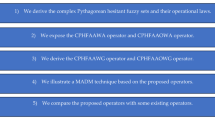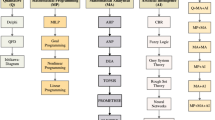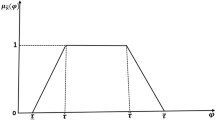Abstract
The Dombi operators provide a flexible structure with its adjustable parameter because of Dombi generalized structure. On the other hand, priority aggregation operators play an important role in expressing the importance level of alternatives and attributes. In this study, novel Dombi prioritized aggregations are developed on q-rung orthopair fuzzy sets (q-ROFSs). The q-ROFSs include many fuzzy sets with dynamically changing q parameters. q-ROFSs include intuitionistic fuzzy sets, Pythagorean fuzzy sets and Fermatean fuzzy sets according to value of q parameter. In this study, Dombi prioritized aggregation of q-ROFSs is presented. The operators introduced are q-ROFSs Dombi prioritized weighted averaging operator (q-ROFSDPWA) and q-ROFSs Dombi prioritized weighted geometric operator (q-ROFSDPWG). We also investigate some of the properties of these operators. The proposed operators are used in MULTIMOORA method. The proposed methods with new aggregation operators are analyzed according to the q parameter of q-ROFSs and Dombi parameter on numerical example and also compared with other existing studies. It is seen that novel q-ROFSDPWA and q-ROFSDPWG aggregations give reasonable and stable results for multiple criteria decision making problem.


Similar content being viewed by others
References
Atanassov KT (1986) Intuitionistic fuzzy sets. Fuzzy Sets Syst 20:87–96
Baležentis T, Zeng S (2013) Group multi-criteria decision making based upon interval-valued fuzzy numbers: an extension of the multimoora method. Expert Syst Appl 40:543–550
Baležentis A, Baležentis T, Brauers WKM (2012) Personnel selection based on computing with words and fuzzy multimoora. Expert Syst Appl 39:7961–7967
Baležentis T, Zeng S, Baležentis A (2014) Multimoora-IFN: a MCDM method based on intuitionistic fuzzy number for performance management. Econ Comput Econ Cybern Stud Res 48:85–102
Boran FE, Genç S, Kurt M, Akay D (2009) A multi-criteria intuitionistic fuzzy group decision making for supplier selection with topsis method. Expert Syst Appl 36:11363–11368
Brans J-P, Mareschal B (2005) Promethee methods. In: Multiple criteria decision analysis: state of the art surveys. Springer, pp 163–186
Brauers WK, Edmundas M, Zavadskas K (2010) Project management by multimoora as an instrument for transition economies. Technol Econ Dev Econ 16:5–24
Brauers WKM, Zavadskas EK (2011) Multimoora optimization used to decide on a bank loan to buy property. Technol Econ Dev Econ 17:174–188
Chen X, Zhao L, Liang H (2018) A novel multi-attribute group decision-making method based on the multimoora with linguistic evaluations. Soft Comput 22:5347–5361
Dai W, Zhong Q, Qi C (2018) Multi-stage multi-attribute decision-making method based on the prospect theory and triangular fuzzy multimoora. Soft Comput 24:1–12
Deliktas D, Ustun O (2017) Student selection and assignment methodology based on fuzzy multimoora and multichoice goal programming. Int Trans Oper Res 24:1173–1195
Dombi J (1982) A general class of fuzzy operators, the demorgan class of fuzzy operators and fuzziness measures induced by fuzzy operators. Fuzzy Sets Syst 8:149–163
Fattahi R, Khalilzadeh M (2018) Risk evaluation using a novel hybrid method based on FMEA, extended MULTIMOORA, and AHP methods under fuzzy environment. Saf Sci 102:290–300
Gao H (2018) Pythagorean fuzzy hamacher prioritized aggregation operators in multiple attribute decision making. J Intell Fuzzy Syst 35:2229–2245
Garg H (2017) Confidence levels based pythagorean fuzzy aggregation operators and its application to decision-making process. Comput Math Organ Theory 23:546–571
Geetha S, Narayanamoorthy S, Kang D, Kureethara JV (2019) A novel assessment of healthcare waste disposal methods: intuitionistic hesitant fuzzy MULTIMOORA decision making approach. IEEE Access 7:130283–130299
Hafezalkotob A, Hafezalkotob A, Liao H, Herrera F (2019) An overview of MULTIMOORA for multi-criteria decision-making: theory, developments, applications, and challenges. Inf Fusion 51:145–177
Jahan A, Mustapha F, Ismail MY, Sapuan SM, Bahraminasab M (2011) A comprehensive VIKOR method for material selection. Mater Des 32:1215–1221
Jana C, Muhiuddin G, Pal M (2019a) Some Dombi aggregation of q-rung orthopair fuzzy numbers in multiple-attribute decision making. Int J Intell Syst 34:3220–3240
Jana C, Pal M, Wang J (2019b) Bipolar fuzzy Dombi prioritized aggregation operators in multiple attribute decision making. Soft Comput 24:1–16
Khan MS, Ali SA, Ali A, Amin F (2019) Pythagorean fuzzy prioritized aggregation operators and their application to multi-attribute group decision making. Granul Comput 4:249–263
Kutlu Gündoğdu F (2020) A spherical fuzzy extension of MULTIMOORA method. J Intell Fuzzy Syst 38:1–16
Li Z-H (2014) An extension of the MULTIMOORA method for multiple criteria group decision making based upon hesitant fuzzy sets. J Appl Math 2014:1–16
Liang D, Darko AP, Zeshui X, Wang M (2019a) Aggregation of dual hesitant fuzzy heterogenous related information with extended bonferroni mean and its application to MULTIMOORA. Comput Ind Eng 135:156–176
Liang D, Darko AP, Zeng J (2019b) Interval-valued pythagorean fuzzy power average-based MULTIMOORA method for multi-criteria decision-making. J Exp Theor Artif Intell, pp. 1–30
Liang W, Zhao G, Hong C (2019c) Selecting the optimal mining method with extended multi-objective optimization by ratio analysis plus the full multiplicative form (MULTIMOORA) approach. Neural Comput Appl 31:5871–5886
Liao H, Zeshui X (2014) Multi-criteria decision making with intuitionistic fuzzy promethee. J Intell Fuzzy Syst 27:1703–1717
Lin L, Yuan X-H, Xia Z-Q (2007) Multicriteria fuzzy decision-making methods based on intuitionistic fuzzy sets. J Comput Syst Sci 73:84–88
Lin R, Zhao X, Wei G (2013) Fuzzy number intuitionistic fuzzy prioritized operators and their application to multiple attribute decision making. J Intell Fuzzy Syst 24:879–888
Liu P (2013) Some Hamacher aggregation operators based on the interval-valued intuitionistic fuzzy numbers and their application to group decision making. IEEE Trans Fuzzy Syst 22:83–97
Liu P, Liu J (2018) Some q-rung orthopai fuzzy bonferroni mean operators and their application to multi-attribute group decision making. Int J Intell Syst 33:315–347
Liu H-W, Wang G-J (2007) Multi-criteria decision-making methods based on intuitionistic fuzzy sets. Eur J Oper Res 179:220–233
Liu P, Chen SM, Wang P (2018) Multiple-attribute group decision-making based on q-rung orthopair fuzzy power maclaurin symmetric mean operators. IEEE Trans Syst Man Cybern Syst 33:2341–2363
Liu D, Peng D, Liu Z (2019) The distance measures between q-rung orthopair hesitant fuzzy sets and their application in multiple criteria decision making. Int J Intell Syst 34:2104–2121
Ma Z, Zeshui X (2016) Symmetric pythagorean fuzzy weighted geometric/averaging operators and their application in multicriteria decision-making problems. Int J Intell Syst 31:1198–1219
Omar MN, Fayek AR (2016) A topsis-based approach for prioritized aggregation in multi-criteria decision-making problems. J Multi-Criteria Decis Anal 23:197–209
Senapati T, Yager RR (2019) Fermatean fuzzy sets. J Ambient Intell Humaniz Comput 11(2):663–674
Shouzhen ZENG, Baležentis A, Weihua SU (2013) The multi-criteria hesitant fuzzy group decision making with MULTIMOORA method. Econ Comput Econ Cybern Stud Res 47:171–184
Stanujkic D, Zavadskas EK, Smarandache F, Brauers WKM, Karabasevic D (2017) A neutrosophic extension of the MULTIMOORA method. Informatica 28:181–192
Stanujkic D, Karabasevic D, Zavadskas EK, Smarandache F, Brauers WKM (2019) A bipolar fuzzy extension of the MULTIMOORA method. Informatica 30:135–152
Torra V (2010) Hesitant fuzzy sets. Int J Intell Syst 25:529–539
Wang X, Triantaphyllou E (2008) Ranking irregularities when evaluating alternatives by using some electre methods. Omega 36:45–63
Wang J, Wei G, Wei C, Wei Y (2019) Mabac method for multiple attribute group decision making under q-rung orthopair fuzzy environment. Defence Technol 16:208–216
Wei G (2012) Hesitant fuzzy prioritized operators and their application to multiple attribute decision making. Knowl Based Syst 31:176–182
Wei G, Gao H, Wei Y (2018a) Some q-rung orthopair fuzzy Heronian mean operators in multiple attribute decision making. Int J Intell Syst 33:1426–1458
Wei G, Mao L, Tang X, Wei Y (2018b) Pythagorean hesitant fuzzy Hamacher aggregation operators and their application to multiple attribute decision making. Int J Intell Syst 33:1197–1233
Xia M, Zeshui X, Zhu B (2012) Some issues on intuitionistic fuzzy aggregation operators based on Archimedean t-conorm and t-norm. Knowl Based Syst 31:78–88
Xian S, Liu Z, Gou X, Wan W (2020) Interval 2-tuple pythagorean fuzzy linguistic MULTIMOORA method with CIA and their application to MCGDM. Int J Intell Syst 35:650–681
Xu Z (2007) Intuitionistic fuzzy aggregation operators. IEEE Trans Fuzzy Syst 15:1179–1187
Xu Z, Yager RR (2006) Some geometric aggregation operators based on intuitionistic fuzzy sets. Int J Gen Syst 35:417–433
Xue Y-X, You J-X, Lai X-D, Liu H-C (2016) An interval-valued intuitionistic fuzzy MABAC approach for material selection with incomplete weight information. Appl Soft Comput 38:703–713
Yager RR (1988) On ordered weighted averaging aggregation operators in multicriteria decisionmaking. IEEE Trans Syst Man Cybern 18:183–190
Yager RR (2008) Prioritized aggregation operators. Int J Approx Reason 48:263–274
Yager RR (2013) Pythagorean fuzzy subsets. In: 2013 joint IFSA world congress and NAFIPS annual meeting (IFSA/NAFIPS). IEEE, pp 57–61
Yager RR (2016) Generalized orthopair fuzzy sets. IEEE Trans Fuzzy Syst 25:1222–1230
Zadeh LA (1965) Fuzzy sets. Inf Control 8:338–353
Zavadskas EK, Antucheviciene J, Razavi Hajiagha SH, Hashemi SS (2015) The interval-valued intuitionistic fuzzy MULTIMOORA method for group decision making in engineering. Math Probl Eng 2015:1–13
Zhang Z (2014) Intuitionistic trapezoidal fuzzy prioritized operators and their application to multiple attribute group decision making. J Adv Math Comput Sci 4:1951–1998
Zhang C, Chen C, Streimikiene D, Balezentis T (2019) Intuitionistic fuzzy MULTIMOORA approach for multi-criteria assessment of the energy storage technologies. Appl Soft Comput 79:410–423
Zhao X, Wei G (2013) Some intuitionistic fuzzy Einstein hybrid aggregation operators and their application to multiple attribute decision making. Knowl Based Syst 37:472–479
Zhao H, You J-X, Liu H-C (2017) Failure mode and effect analysis using MULTIMOORA method with continuous weighted entropy under interval-valued intuitionistic fuzzy environment. Soft Comput 21:5355–5367
Acknowledgements
Supported by organization scientific research project of Eskisehir Technical University for project topic named “Using generalized fuzzy sets in multiple criteria decision making systems”. (Grant No: 20DRP041)
Author information
Authors and Affiliations
Corresponding author
Ethics declarations
Conflict of interest
All authors declare that they have no conflict of interest
Ethical approval
This article does not contain any studies with human participants or animals performed by any of the authors.
Additional information
Communicated by V. Loia.
Publisher's Note
Springer Nature remains neutral with regard to jurisdictional claims in published maps and institutional affiliations.
Rights and permissions
About this article
Cite this article
Aydemir, S.B., Yilmaz Gündüz, S. Extension of multi-Moora method with some q-rung orthopair fuzzy Dombi prioritized weighted aggregation operators for multi-attribute decision making. Soft Comput 24, 18545–18563 (2020). https://doi.org/10.1007/s00500-020-05091-4
Published:
Issue Date:
DOI: https://doi.org/10.1007/s00500-020-05091-4




